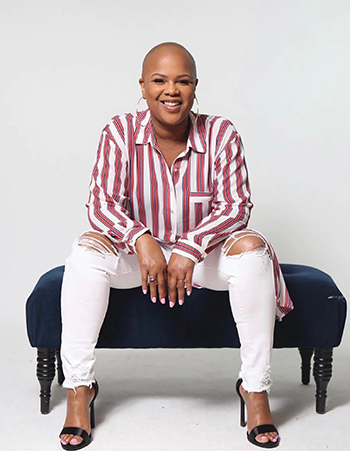Advanced Breast Cancer Survivor
Survivor promotes clinical trials for the greater good

Sheila Marie Johnson was diagnosed de novo (at first occurrence) with Stage IV breast cancer at 43. She immediately began treatment, but over time, the cancer progressed. After the fourth progression, her doctor recommended a clinical trial. Today, Sheila’s cancer is stable, and she is passionate about encouraging other African American women to consider clinical trials.
Being diagnosed with metastatic breast cancer is a day I will never forget. My mother had passed away in 2004 from metastatic breast cancer, and now I was facing the same thing. It was devastating.
It started when I sneezed and felt a strange burning sensation in my chest. When it happened again a couple weeks later, I saw my doctor and had a mammogram. I knew something was wrong when the technician asked me to sit down. The radiologist pointed to the scan. The white areas in my breast were cancer and the burning sensation I felt was the cancer that had already metastasized to my ribs.
At the time, I was actively serving in the Air Force and hoped to become a chief master sergeant. Military bases don’t have oncology doctors, so I was sent to a cancer center. Biopsy results there determined the breast cancer was ER+, PR+, HER2+. Additional scans showed the cancer had also spread to my liver.
After consulting with a breast surgeon, I asked for a mastectomy. She was reluctant, though, because she thought there was no need since the cancer was already in my bloodstream. Instead she recommended removing my ovaries because my cancer was driven by hormones. Then she referred me to a medical oncologist, who started me on chemotherapy. Because my cancer was driven by hormones and HER2, I started hormone therapy and anti-HER2 targeted therapy as well. This would be my treatment plan as long as it was effective.
Though I had my ovaries removed, I kept pressing for a mastectomy. Eventually, my oncologist took my information to a tumor board. They didn’t see any reason not to have a mastectomy, so I proceeded with surgery to remove my right breast and had a breast reduction of my left breast. When my reconstructive surgery with expanders didn’t work because of infection, I switched to wearing a prosthesis. Later, I had the DIEP flap procedure, which made me look and feel more normal.
My condition was relatively stable for some years, but, over time, the cancer stopped responding to the treatment. We needed to explore other options. After my cancer progressed for the fourth time, my doctor offered the opportunity to enroll in a clinical trial. I trust my doctor completely, and I agreed.
I feel blessed to have a doctor who suggested a clinical trial. It made me trust her even more because it showed she had my best interests at heart. The trial she recommended was testing a new anti-HER2 targeted therapy for metastatic HER2+ breast cancer. I did some research, took the Informed Consent form home to read more about it and decided to join the trial.
The targeted therapy reduced the cancer, but I had a lot of nausea. Communicating with the trial team was crucial. When I told them, they began giving me fluids before treatment, which really helped. And, when some other side effects became severe, they reduced the dose so I’d be more comfortable. I am beyond grateful that I have a medical team that listens. It’s made my quality of life so much better.
I stayed in the trial until I had to leave because of COVID-induced pneumonia. I took a short break from treatment and have since returned to chemotherapy.
Would I opt for a clinical trial again? Absolutely!
I tell everyone who will listen that participating in clinical trials is important and valuable. Just by participating in a clinical trial, you are contributing to the future of cancer care. And people of color are especially needed. That is why I am passionate about encouraging other African Americans to consider participating. I share this message on social media, with cancer organizations, and at speaking events.
From my research, African American women very seldom participate in clinical trials for a number of reasons: lack of awareness, communication issues with their medical team, economic factors and distrust.
To combat that skepticism, I remind them that every cancer medication was once approved through a trials process. Someone had to take that medication before them. These medicines go through a rigorous amount of testing.
Clinical trials also offer you the opportunity to try a new drug that may be covered by the trial or your insurance.
That can save you the cost of the new medication — and cancer medications can be very expensive.
If your doctor doesn’t discuss clinical trials with you at the first couple of meetings, ask about them, even if you aren’t interested in participating at the time. You never know when a clinical trial may be your best option. It could even save your life.


